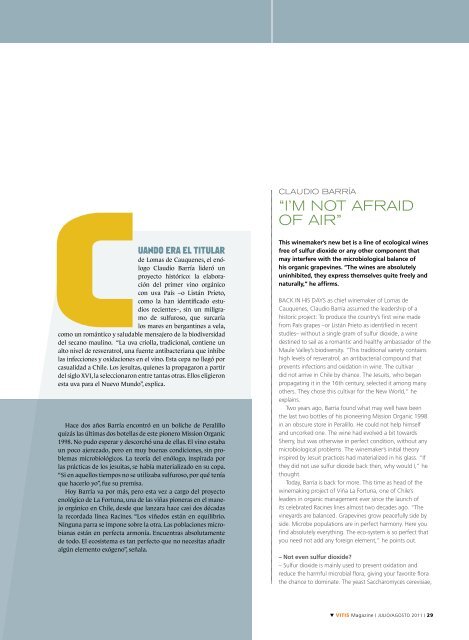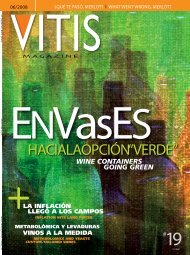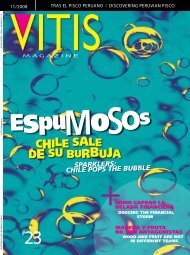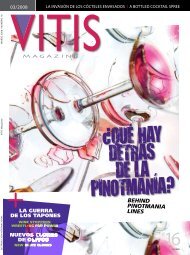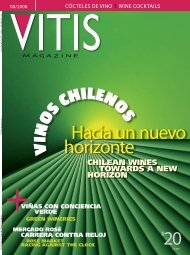VINOS DE PARRAS ANTIGUAS - Vitis Magazine
VINOS DE PARRAS ANTIGUAS - Vitis Magazine
VINOS DE PARRAS ANTIGUAS - Vitis Magazine
Create successful ePaper yourself
Turn your PDF publications into a flip-book with our unique Google optimized e-Paper software.
CUANDO eRA eL tItULAR<br />
de Lomas de Cauquenes, el enólogo<br />
Claudio Barría lideró un<br />
proyecto histórico: la elaboración<br />
del primer vino orgánico<br />
con uva País –o Listán Prieto,<br />
como la han identificado estudios<br />
recientes–, sin un miligramo<br />
de sulfuroso, que surcaría<br />
los mares en bergantines a vela,<br />
como un romántico y saludable mensajero de la biodiversidad<br />
del secano maulino. “La uva criolla, tradicional, contiene un<br />
alto nivel de resveratrol, una fuente antibacteriana que inhibe<br />
las infecciones y oxidaciones en el vino. Esta cepa no llegó por<br />
casualidad a Chile. Los jesuitas, quienes la propagaron a partir<br />
del siglo XVI, la seleccionaron entre tantas otras. Ellos eligieron<br />
esta uva para el Nuevo Mundo”, explica.<br />
Hace dos años Barría encontró en un boliche de Peralillo<br />
quizás las últimas dos botellas de este pionero Mission Organic<br />
1998. No pudo esperar y descorchó una de ellas. El vino estaba<br />
un poco ajerezado, pero en muy buenas condiciones, sin problemas<br />
microbiológicos. La teoría del enólogo, inspirada por<br />
las prácticas de los jesuitas, se había materializado en su copa.<br />
“Si en aquellos tiempos no se utilizaba sulfuroso, por qué tenía<br />
que hacerlo yo”, fue su premisa.<br />
Hoy Barría va por más, pero esta vez a cargo del proyecto<br />
enológico de La Fortuna, una de las viñas pioneras en el manejo<br />
orgánico en Chile, desde que lanzara hace casi dos décadas<br />
la recordada línea Racines. “Los viñedos están en equilibrio.<br />
Ninguna parra se impone sobre la otra. Las poblaciones microbianas<br />
están en perfecta armonía. Encuentras absolutamente<br />
de todo. El ecosistema es tan perfecto que no necesitas añadir<br />
algún elemento exógeno”, señala.<br />
CLAUDIO BARRÍA<br />
“I’m nOT AfRAID<br />
Of AIR”<br />
This winemaker’s new bet is a line of ecological wines<br />
free of sulfur dioxide or any other component that<br />
may interfere with the microbiological balance of<br />
his organic grapevines. “The wines are absolutely<br />
uninhibited, they express themselves quite freely and<br />
naturally,” he affirms.<br />
Back in his days as chief winemaker of lomas de<br />
cauquenes, claudio Barría assumed the leadership of a<br />
historic project: to produce the country’s first wine made<br />
from País grapes –or listán Prieto as identified in recent<br />
studies– without a single gram of sulfur dioxide, a wine<br />
destined to sail as a romantic and healthy ambassador of the<br />
Maule Valley’s biodiversity. “this traditional variety contains<br />
high levels of resveratrol, an antibacterial compound that<br />
prevents infections and oxidation in wine. the cultivar<br />
did not arrive in chile by chance. the jesuits, who began<br />
propagating it in the 16th century, selected it among many<br />
others. they chose this cultivar for the new World,” he<br />
explains.<br />
two years ago, Barría found what may well have been<br />
the last two bottles of his pioneering Mission organic 1998<br />
in an obscure store in Peralillo. he could not help himself<br />
and uncorked one. the wine had evolved a bit towards<br />
sherry, but was otherwise in perfect condition, without any<br />
microbiological problems. the winemaker’s initial theory<br />
inspired by jesuit practices had materialized in his glass. “if<br />
they did not use sulfur dioxide back then, why would i,” he<br />
thought.<br />
today, Barría is back for more. this time as head of the<br />
winemaking project of Viña la Fortuna, one of chile’s<br />
leaders in organic management ever since the launch of<br />
its celebrated Racines lines almost two decades ago. “the<br />
vineyards are balanced. grapevines grow peacefully side by<br />
side. Microbe populations are in perfect harmony. here you<br />
find absolutely everything. the eco-system is so perfect that<br />
you need not add any foreign element,” he points out.<br />
– Not even sulfur dioxide?<br />
– sulfur dioxide is mainly used to prevent oxidation and<br />
reduce the harmful microbial flora, giving your favorite flora<br />
the chance to dominate. the yeast saccharomyces cerevisiae,<br />
▼ <strong>Vitis</strong> <strong>Magazine</strong> l julio/agosto 2011 l 29


